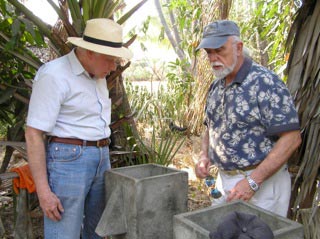History of the Project

Water for Cambodia (WFC) originated in 2002 under the direction of Middletown Rhode Island Rotarian Gunther Hausen. On a visit to Angkor Children’s Hospital in Siem Reap Gunther and his wife Nicole learned of the hundreds of children arriving at the hospital with preventable waterborne diseases due to the lack of clean drinking water. In response to the hospital's urgent request for help, Gunther began the Water for Cambodia project.
In February 2006 WFC was officially launched with the hiring of the first full-time staff members in Cambodia. By the end of 2006 a pilot project was completed with the installation of 50 biosand filters and 2 literacy classes that enrolled 50 students. During 2007 and early 2008 the Siem Reap Water Quality Laboratory was established with funding from the Rotary Club of Tokyo, Japan. This important addition allows the project to monitor filter effectiveness in providing safe water. With the addition of a field test technician and filter installation specialist and funding from Rotary clubs from Edinburgh, Scotland and Lyon, France filter production was increased. By mid-2008 nearly 1100 biosand filters had been built and installed. Later that year, the Rotary Foundation awarded WFC a significant 3-year grant that funded expanded production and installation of filters.
Since those early years, the program has continued to grow. In 2020, the project surpassed 25,000 biosand filters installed in households and schools, reaching an estimated 150,000 people in northern Cambodia with clean drinking water. The project has the capacity to build and install from 2000-2500 filters per year.
In the early years, literacy training was needed, especially for adult women who may have had no opportunity for formal education. More recently, the educational emphasis has turned to hygiene education, as the Cambodian government has increased resources for schools. Increasingly, the program’s approach is the globally recognized WASH—Water, Sanitation and Hygiene. WFC has projects in some communities and schools to build latrines to further protect health and safe water along with filter installation. In other communities, wells are needed and the project has constructed a number of secure ring wells. As of mid 2021, 41 new wells and 422 latrines (10 double latrines at schools) were built in addition to the biosand filter construction and installation.
The water testing lab has continued to expand its capacities. Additional equipment and staff training have added food microbiology and it is now a sophisticated regional facility. Its services are commercially available, providing an important resource for Siem Reap hotels and restaurants and offsetting the costs of the lab and helping to fund.
When conditions allow, WFC has hosted numerous groups of students and other visitors from countries in Asia, North America, Europe and Australia. Student groups go into the field with WFC staff and assist in installations, learning valuable lessons about conditions of rural life and sanitation challenges. In this way, WFC has contributed more broadly to global education and the WASH movement.
Growth of Water for Cambodia has been made possible by generous donations from individuals and corporations in diverse countries and the support of grants received from numerous sources, including Rotary International, local Rotary Clubs, and organizations in the United States, UK and Singapore and more.